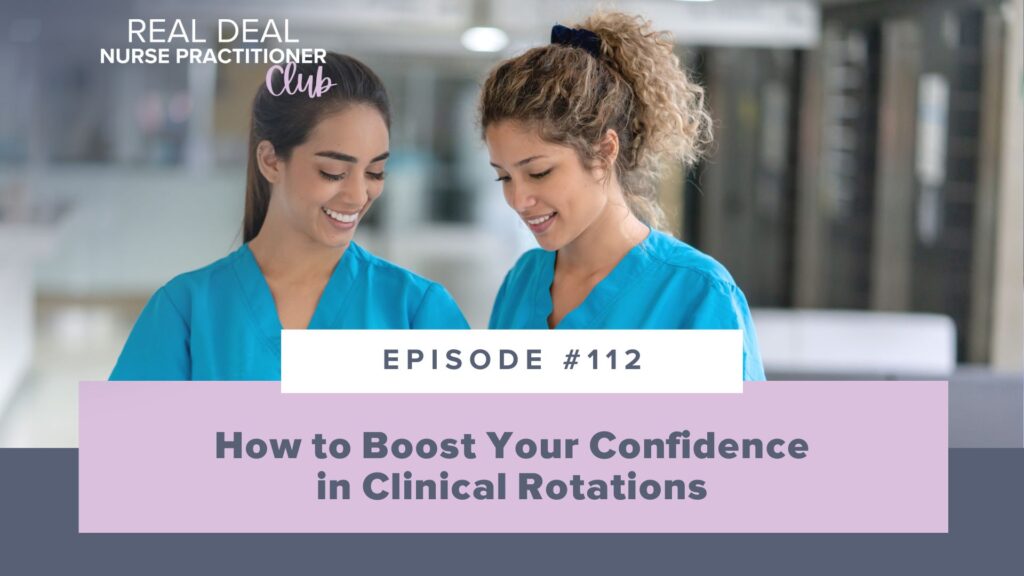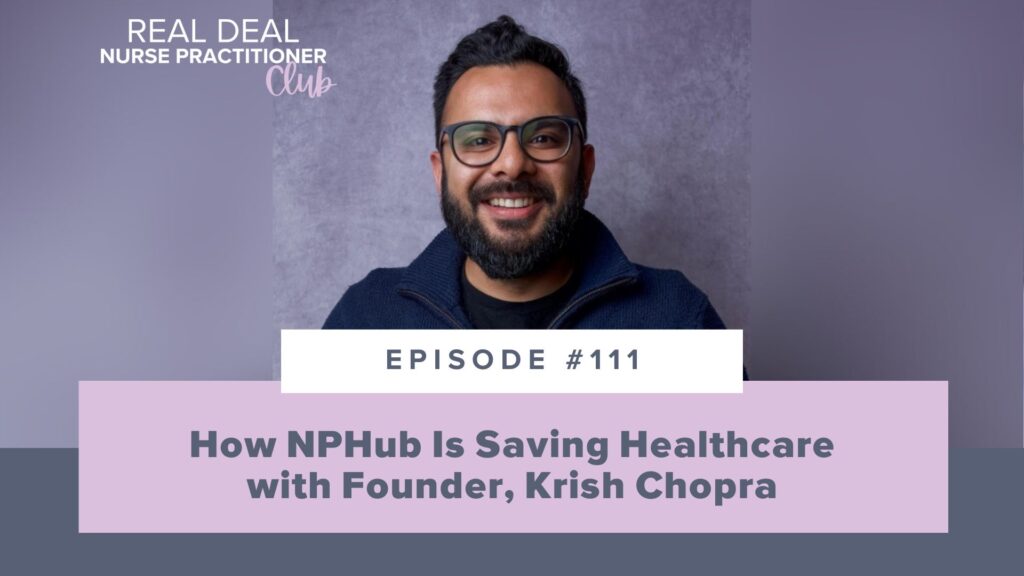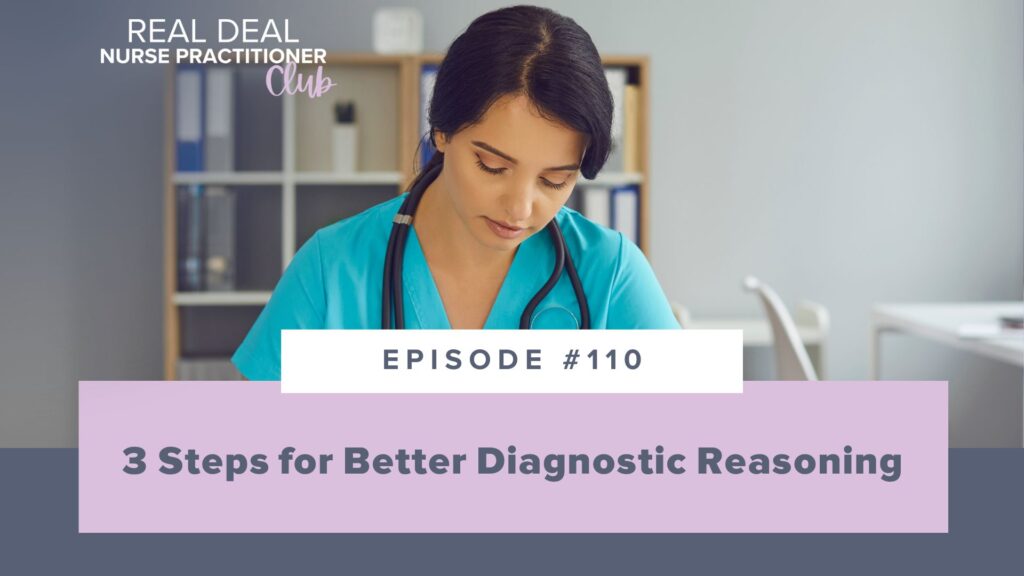Ep #107: Global Nursing: How Nurse Practitioners Can Make a Positive Impact
- by Sarah Michelle
- Feb 21, 2024
- Podcasts
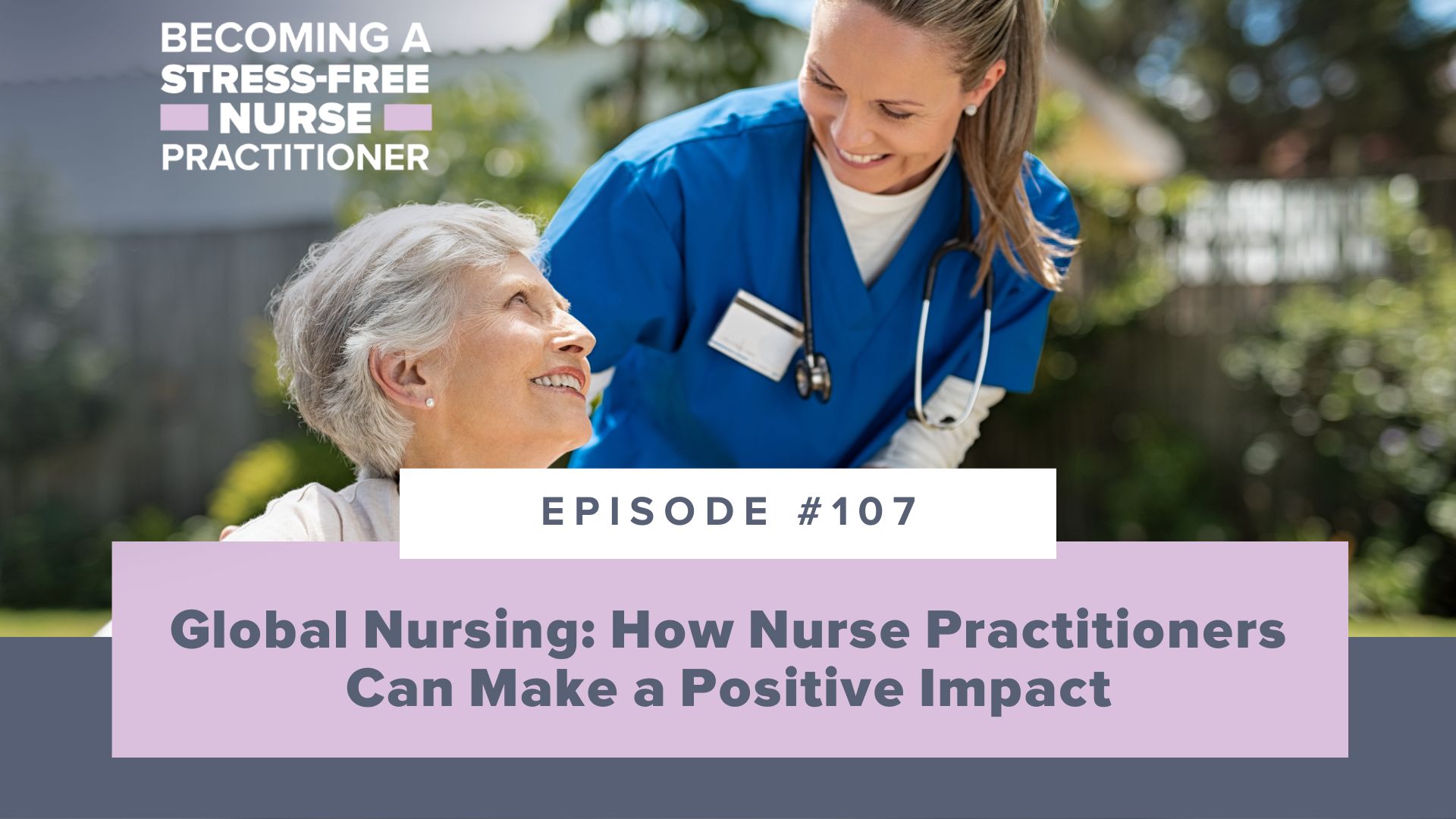
The nursing profession aims to serve people all over the world, and this week, we’re diving into some of the global health initiatives in which Nurse Practitioners can get involved. If you have an interest in working on a medical mission or teaching health promotion to vulnerable populations, you’re going to love this episode.
There are many unique and amazing opportunities out there for Nurse Practitioners when it comes to global health. The great news is that because global health is a top priority, there are several resources available for exploration. Anna and I are here this week to guide you through the ins and outs of your global health journey.
Listen in this week to hear how Nurse Practitioners can fill the gap in global health initiatives, important considerations to keep in mind, and why NPs in all specialties can play an essential role in improving health worldwide.
If you’re looking for support, no matter what phase of your nurse practitioner journey you’re currently in, I have communities available for both students and new nurse practitioners. In these communities, we work to uplift one another and grow this profession together every day. Interested? Click here if you’re a student and click here if you’re a new NP!
What You Will Discover:
- What global health means.
- The opportunities available for Nurse Practitioners to get involved in global health initiatives.
- How global health equity can be improved.
- The challenges that come with global health.
- Our top tips for getting involved in global health nursing.
Featured on the Show
- Follow me on: Facebook | Instagram | YouTube | TikTok
- AANP
- CDC Traveler’s Health guide
- MedicalMissions
- The Global Network of WHO Collaborating Centers for Nursing and Midwifery
Full Episode Transcript:

Welcome to Becoming a Stress-Free Nurse Practitioner, a show for new NPs and students that want to pass their board exam the first time and make that transition from RN to NP as seamless as possible. I’m your host Sarah Michelle. Now, let’s dive into today’s episode.
Sarah: Hello, my friend. The topic that we are going to be talking about today is global nursing and how nurse practitioners just like us can make a positive impact. The nursing profession aims to serve people all over the world and we are going to talk today about some of those global health initiatives that nurse practitioners can get involved in.
If you have a passion to work on a medical mission or to teach health promotion to those vulnerable populations, then you are going to be so excited about this episode. And I have Anna joining me today to talk about some of these really important concepts too.
Anna: Yeah, thanks. I just love how many opportunities there are for NPs, and there’s definitely some unique and amazing ones in global health. And we’ll talk about some of these opportunities and some of the challenges you might face and just discuss some of those resources that you’ll have for support and to guide you on this global health journey, but first I think we should back up a little bit.
For those that don’t know, Sarah, can you talk about what global health even means in the first place?
Sarah: Yes, absolutely, because that is such a broad term that seems a little vague. So global health is a term for the health of populations worldwide. So within that term, global looks at health equity and access to healthcare in countries all over the world. And then to go even deeper than that, we can begin to look at social determinants of health and possible solutions to improving health equity.
Hopefully these are all things that you’ve heard about in school before, but maybe just hasn’t been at the forefront for you for a little bit.
Anna: Yeah, and if you don’t quite remember those, if you remember Healthy People 2030, it defines those social determinants of health that Sarah mentioned as the conditions in the environments where people are born, live, learn, play, work, worship, and age that affect a wide range of health, functioning, and quality of life outcomes and risks.
So essentially what that means is how a person grows up and the resources they do and do not have affects their health. So for example, think about how you grew up. Did you have clean water? Did you have health insurance that provided access to preventative care like vaccines? Did you feel safe in your neighborhood? Did you always have enough food to eat? Things like that.
Sarah: Exactly. So we are going to explore what we can do as nurse practitioners to improve the health equity and healthcare outcomes for people across the globe.
One of the biggest ways that global health can be improved is through access to primary care, which includes the health promotion and those disease prevention efforts. And that’s really where us as nurse practitioners can really start to help fill the gap. Around 70 countries have some type of either nurse practitioner or similar advanced practice nursing role. And those nurse practitioners are essential to providing high quality care and improving the overall access to healthcare to create those positive health outcomes for patients all across the world.
Anna: Yeah, and I want to mention too, before I forget that AANP actually has an international special interest group literally dedicated to caring for the world as a global community. So if global health is a passion of yours or you’re sounding interested in that after this episode and you’re a member of AANP, I would suggest joining that special interest group because you can just make a lot of great connections with networking. And you know we love networking.
Sarah: Yes, networking is always a positive for us.
You mentioned this earlier, Anna, but the opportunities for nurse practitioners, both in general and in global health are kind of endless. And you can help to create health policies to improve the access to care. You can advocate for the advancement of our profession to improve scope of practice in areas of the world where it’s limited. You can volunteer on medical missions and provide care to the underserved. And we’ll of course mention some great resources to find mission opportunities coming up too.
Anna: Yeah, and another important area I want to touch on is research. We 100% need more information about the care that nurse practitioners provide on a global scale, right? We know that nurse practitioners provide holistic, safe, patient-centered care at an affordable cost and that our patients have good outcomes. But we need to know more about how nurse practitioners in other countries are doing as well.
Sarah: Yeah, so we’re not isolating ourselves and we’re kind of like keeping our eyes wide open to what everyone is doing. And you know, it would not be an SMNP podcast if we didn’t mention the importance of education. So we need more nurse practitioners in those low and middle income countries, but there are difficulties with the infrastructure of nursing education. And you can collaborate with stakeholders in those countries to teach nursing to students and ultimately improve their access to care.
Now, you may really feel a passion here, but like anywhere, there are going to be some challenges in global health. One of the more obvious challenges is the potential for language and or cultural barriers. Definitely important here to do your research about the cultures and the customs of the area that you will be serving before you go. And not only is it going to help just with your comfort level and what to expect and anxiety, but it will also help you to better connect with these patients and allow you to more quickly establish that rapport.
For the language barrier, I would start by learning a few key phrases. But also too, check with your organization about what translating services are going to be available to you. And Anna, what are some other challenges you might be thinking of here?
Anna: One that I’ve heard of is just dealing with limited resources and infrastructure. So if you’re traveling to low income countries on medical missions, you definitely want to inquire about access to food and water. What about electricity? What medical resources will you have available to you and what supplies do you need to bring? Because it’s going to look a lot different than the clinics you’re used to working in.
And you can also check on the CDC’s travelers website to find out if you’ll need any vaccinations prior to traveling.
Sarah: Yeah, and right along those same lines to think about your safety. You know, some countries you travel to might have war or conflict or other things going on, so make sure that you know how to protect yourself and the group that you’re a part of, too.
Anna: Yeah, that is super important. And it kind of leads me to thinking about some of those ethical considerations in global health care. So what are your thoughts on that, Sarah?
Sarah: Well, combining language barriers, different cultures, the potential, obviously, for those limited resources, it’s imperative that we do a lot of self reflection. You might be faced with hard decisions about who receives care and what they can receive, which is probably quite different from how you would care for patients in your own practice at home, and this can trigger a lot of moral distress. And so you should make sure that you have someone to talk to about any struggles you may face. And of course, just some coping mechanisms too to go with.
But I do want to end on a positive note, it’s very important to me. So there are several organizations that you can reach out to if you are interested in global health initiatives and medical missions. And if you are leaning more towards a medical mission with religion as a foundation, then I suggest checking out medicalmissions.com. There’s a great wealth of information there, including the different types of opportunities, short term missions, long term missions. And it can really help connect you with different organizations that match your personal interests, which is going to be important.
Anna: Yeah, and another great option I know of is through the World Health Organization or the WHO. And it’s a bit of a mouthful, but the Global Network of WHO Collaborating Centers for Nursing and Midwifery is an international volunteer organization, and it aims to promote health for all. So the WHO Collaborating Center also advocates for the nursing profession. So your role as a nurse practitioner is supported and celebrated there.
Sarah: And I know we mentioned it for a brief second earlier, and I know I got excited about it as soon as the word came up, but another way to get started is just by networking. Check out local and national nursing and medical conferences. There are very likely going to be presentations or exhibitors that want to talk about their global health initiatives and their opportunities for nurse practitioners.
In general, conferences and events are a great way to network and connect with like-minded professionals and just help you get started with global health nursing.
Anna: Yeah, I always love just seeing the variety of people and presenters at the AANP conference when we go every year. Like, I’m already so looking forward to it this summer. And we both know traveling is not cheap, and you can have just the best intentions in caring for underserved populations, but make sure you are able to secure the funds to travel and get your supplies.
But the good news is that because global health is a top priority, there are several organizations and resources you can reach out to on this. Like, if you just do a quick internet search for funding for global health nursing initiatives, it will turn up a ton of grants that you can apply for. And if you are in school still, you may consider reaching different scholarships or anything like that that interests you.
And depending on your mission and your objectives and the size of your group, you can apply for grants of a few thousand dollars, upward of a few hundreds of thousand dollars.
Sarah: Yes, I think we’ve covered so much great information so quickly. So this is a big topic, it’s even bigger than what we covered in this episode. But hopefully, just by talking about it, we’ve made it a little bit more manageable and digestible and easy to understand. And hopefully there are some of you out there listening right now that are going to start looking into global nursing and what that means for you.
All nurse practitioners in all specialties, and especially in primary care, can play an essential role in improving health worldwide. And you know how much of an impact that you can make in patients’ lives here at home, just imagine what you could do abroad with that knowledge as well.
Anna: Yeah, truly, no matter your role in healthcare or the specialty you are in, you can make a difference globally if you desire. Like, even back in my RN job in labor and delivery, there was an awesome surgical tech that I worked with, and he was a big part in going overseas with providers and nurses to give OBGYN care.
So maybe this episode just encourages you to explore some global health nursing opportunities, because you will be amazed at how much of an impact you can make no matter what you want to do.
Sarah: Yeah, and there’s just so many different opportunities available. I think sometimes we get trapped in the traditional landscape of nursing and being a nurse practitioner, and this is just another branch of something different that you could be doing.
But thank you so much for tuning in with this episode for us, and we’ll be talking to you very soon.
As an extra bonus, friends, if you’re looking for support no matter what phase of your nurse practitioner journey you’re currently in, I have communities available for both students and new nurse practitioners. In these communities, we work to uplift one another and grow this profession together every single day. Links to join will be included for you in the show notes.
Thanks for listening to Becoming a Stress-Free Nurse Practitioner. If you want more information about the different types of support we offer to students and new NPs, visit npreviews.com/resources. See you next week.
Enjoy the Show?
- Don’t miss an episode: follow the podcast on Spotify, Apple Podcasts, Google Podcasts, or RSS.
Related Posts
Search the Blog
Join our Facebook Group!
Get FREE support and encouragement from thousands of NP students and our NP Support team.
Learn More3 Study Hacks to Conquer Your NP Exam!
Download these tips that have helped thousands of students pass their NP board exams.
Download NowInstitutional Partnerships
Are you a faculty member and would like to bring Sarah Michelle’s resources to your school? Email us at nursinggroups@blueprintprep.com for special institutional pricing or click on the link below to learn more.
Learn MoreGroup Discounts
Are you a student and have 10 or more classmates interested in purchasing Sarah Michelle’s courses? Email us at nursinggroups@blueprintprep.com for special pricing.
